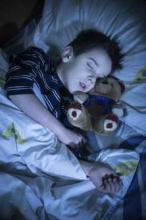Pediatricians can use a short, simple questionnaire to screen children for obstructive sleep apnea, according to a study of children and parents referred to a sleep center for screening.
While the shorter tool is not as sensitive as longer questionnaires, it is faster and easier to use, allowing primary caregivers to screen more children.
About 1%-4% of children are affected by obstructive sleep apnea (OSA), an underdiagnosed condition that can have significant effects on a child’s behavior, performance, and health.
The researchers, led by Dr. Gili Kadmon of the Schneider Children’s Medical Center, Petach Tikva, Israel, developed the IF SLEEPY screen of eight yes/no questions that investigate a child’s snoring, breathing problems during sleep, daytime irritability, sleepiness, moods, concentration problems, and other issues. The screen was given to parents of 150 children aged 3-17 years who had been referred to a sleep center in Toronto. Children aged 7 years or older were also asked to answer a modified questionnaire. Only children who were eligible for a sleep study were included in the sample (Int. J. Pediatr. Otorhinolaryngol. 2014 Oct 7. [doi: 10.1016/j.ijporl.2014.09.018]).
A comparison of the parents’ questionnaire scores with their child’s apnea-hypopnea index obtained during a subsequent overnight polysomnographic study found that the screen had a 78% sensitivity for mild to severe obstructive sleep apnea (OSA) cases, with a 40% specificity. The children’s responses were less sensitive, but more specific (45% and 52%, respectively).
To improve the screen’s specificity, the researchers dropped a question about concentration, creating the I SLEEPY version, which resulted in sensitivity and specificity scores for the parent answers of 76% and 55%, respectively. A third version (I’M SLEEPY) added a measure of the child’s body mass index, which resulted in parent scores that were 82% sensitive and 50% specific.
The new screens’ sensitivities and specificities are lower than those of the three longer pediatric OSA screens currently available. Those screens have 40 or more items, and can yield sensitivities and specificities as high as 91% and 88%. However, the authors suggest that a 1-minute screen with a mnemonic name is better suited for a primary care setting. They report they are currently developing a study of the screen in general pediatric clinics. The authors reported having no disclosures.


